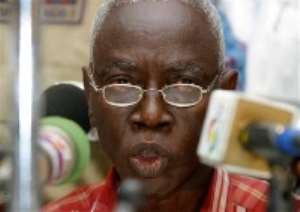
Three prominent Ghanaians domiciled in the United States of America have dragged the Electoral Commission and Government, represented by the Attorney General, to court to compel them to implement the provisions of the Representation of the People's (Amendment) Act (Act 699) in next year"s general elections, as well as any other elections in the country. They also contend that the right to vote ought to go with the right to be voted for.
This suit follows the 2005 passage of the law which allows Ghanaian expatriates to exercise their constitutional right to vote in Ghanaian elections. The suit was filed at the High Court, Kumasi on Tuesday May 8 by Kofi Antwi Boateng, a high-powered accountant based in New York City, Dr Agyenim Boateng, an Assistant Attorney-General with the State of Kentucky, and Kwasi Sarpong Afrifa, Grants Administrator for the renowned Ford Foundation.
With the passage of ROPAA, which enables them to vote, the three men, all holders of dual citizenship, are challenging the constitutional provision which debars them from being voted for as MPs or President or taking up ministerial appointments. A fetter they describe as violating their fundamental human rights. The three are asking the court to compel the EC "to take all the necessary precaution or steps to ensure that the plaintiffs are duly registered so as to exercise their constitutional, legal and fundamental human rights” in order to vote.
They refer to the combined effects of ROPAA and Article 42 of the 1992 Constitution, an entrenched provision guaranteeing the franchise to every Ghanaian of 18 and of sound mind, as imposing a mandatory responsibility on the EC.
Indeed, they contend that “even though Act 699 has long been passed”, government and the EC “have failed to take the necessary step or steps for the plaintiffs to exercise their right to vote” during the recent elections.
All three men, with addresses where notices can be served on them in Ghana, have been very active in organising Ghanaians in the Diaspora to be actively involved in the evolving political processes in Ghana. They all remit frequently to Ghana, according to the suit filed by their lawyer, Nana Obiri Boahen of Enso Nyame Ye Chambers, Sunyani.
The debate over the implementation of ROPAA has stirred up entrenched partisan positions, with the National Democratic Congress leading the opposition. Last week, Foreign Minister Nana Akufo-Addo, addressing an international stakeholders' forum on external voting, noted that with the passage of ROPAA in 2005, additional burdens had been imposed on the Electoral Commission, particularly financial ones. "It is the expectation that the Commission will negotiate these additional financial requirements with the relevant public authorities so that adequate resources will be found to enable the Commission carry out its constitutional and statutory obligations," Nana Akufo-Addo said. This may explain the decision by the three men to join the Attorney-General to the suit since the primary responsibility to finance the exercise rests on Government.
He observed that there is further expectation that the Commission will do its best to ensure that the new law is applied as soon as possible, preferably for the next great popular consultation scheduled for December 2008. Laws on the statute books, which are unapplied, undermine the rule of law, was his contention. But National Democratic Congress flag bearer John Evans Atta Mills contends Ghana is not yet ready to implement ROPAA.
He questions the rationale behind the view expressed by his potential rival in the 2008 presidential race, Nana Akufo-Addo. "This action by the Minister confirms our suspicions when we objected to the passage of this law," Prof Mills told The Statesman earlier in the week.




 Dumsor: Don't rush to demand timetable; the problem may be temporary — Atik Moha...
Dumsor: Don't rush to demand timetable; the problem may be temporary — Atik Moha...
 Space X Starlink’s satellite broadband approved in Ghana — NCA
Space X Starlink’s satellite broadband approved in Ghana — NCA
 2024 election will be decided on the grounds of the economy; choice of running m...
2024 election will be decided on the grounds of the economy; choice of running m...
 Dumsor: We're demanding less; just give us a timetable — Kwesi Pratt to ECG
Dumsor: We're demanding less; just give us a timetable — Kwesi Pratt to ECG
 Do I have to apologise for doing my security work, I won’t – Simon Osei-Mensah r...
Do I have to apologise for doing my security work, I won’t – Simon Osei-Mensah r...
 All my businesses have collapsed under Akufo-Addo — NDC Central regional chair
All my businesses have collapsed under Akufo-Addo — NDC Central regional chair
 Military, Prison Officers clash in Bawku, three injured
Military, Prison Officers clash in Bawku, three injured
 GRA-SML contract: MFWA files RTI request demanding KPMG report
GRA-SML contract: MFWA files RTI request demanding KPMG report
 Court threatens to call second accused to testify if NDC's Ofosu Ampofo fails to...
Court threatens to call second accused to testify if NDC's Ofosu Ampofo fails to...
 Family accuses hospital of medical negligence, extortion in death of 17-year-old...
Family accuses hospital of medical negligence, extortion in death of 17-year-old...
